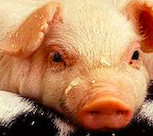Surveillance and Control of Zoonoses

Increasing consumption of meat in developing countries, especially in South East Asia, is leading to new demands on pig and poultry supply chains and emergence of new production networks. These emerging livestock systems (ELS) are linked to peoples' changing food consumption habits, economic status, aspirations and population shifts, and to political contexts. The zoonotic threats posed by these changes are largely unknown.
It is estimate that zoonotic gastrointestinal disease, caused by bacteria such as Salmonella and Campylobacter and related antibiotic resistance, accounts for around 1 million human deaths per year globally with around 800 million people being affected, most of them children under five; a situation also reflected in the study countries Viet Nam and Myanmar which rank in the top 5 hotspots for rapidity and diversity of their ELS (ILRI report to DfID).
The project, led by Professor Duncan Maskell, aims to exploit interdisciplinary expertise including social, biological, and governmental players from Myanmar, Viet Nam and UK to bring about step changes in pro-poor control measures using knowledge-driven and culturally relevant strategies that concomitantly improve animal health and productivity and thus improve and protect human health. Professor Maskell's research group uses genome technologies to interrogate whole bacterial genomes to understand which genes and combinations of genes cause certain bacteria to infect and cause disease in certain hosts including humans, pigs, cattle, and chickens.
Key Publications
1. Genomic signatures of human and animal disease in the zoonotic pathogen Streptococcus suis. Weinert LA, Chaudhuri RR, Wang J, Peters SE, Corander J, Jombart T, Baig A, Howell KJ, Vehkala M, Välimäki N, Harris D, Chieu TT, Van Vinh Chau N, Campbell J, Schultsz C, Parkhill J, Bentley SD, Langford PR, Rycroft AN, Wren BW, Farrar J, Baker S, Hoa NT, Holden MT, Tucker AW, Maskell DJ Nat Commun. 2015 Mar 31;6:6740. doi: 10.1038/ncomms7740.
2. Capturing the cloud of diversity reveals complexity and heterogeneity of MRSA carriage, infection and transmission. Paterson GK, Harrison EM, Murray GG, Welch JJ, Warland JH, Holden MT, Morgan FJ, Ba X, Koop G, Harris SR, Maskell DJ, Peacock SJ, Herrtage ME, Parkhill J, Holmes MA. Nat Commun. 2015 Mar 27;6:6560. doi: 10.1038/ncomms7560.
3. Patterns of genome evolution that have accompanied host adaptation in Salmonella. Langridge GC, Fookes M, Connor TR, Feltwell T, Feasey N, Parsons BN, Seth-Smith HM, Barquist L, Stedman A, Humphrey T, Wigley P, Peters SE, Maskell DJ, Corander J, Chabalgoity JA, Barrow P, Parkhill J, Dougan G, Thomson NR. Proc Natl Acad Sci U S A. 2015 Jan 20;112(3):863-8. doi: 10.1073/pnas.1416707112. Epub 2014 Dec 22.
4. Distinguishable epidemics of multidrug-resistant Salmonella Typhimurium DT104 in different hosts. Mather AE, Reid SW, Maskell DJ, Parkhill J, Fookes MC, Harris SR, Brown DJ, Coia JE, Mulvey MR, Gilmour MW, Petrovska L, de Pinna E, Kuroda M, Akiba M, Izumiya H, Connor TR, Suchard MA, Lemey P, Mellor DJ, Haydon DT, Thomson NR. Science. 2013 Sep 27;341(6153):1514-7. doi: 10.1126/science.1240578. Epub 2013 Sep 12.
5. Comprehensive assignment of roles for Salmonella typhimurium genes in intestinal colonization of food-producing animals. Chaudhuri RR, Morgan E, Peters SE, Pleasance SJ, Hudson DL, Davies HM, Wang J, van Diemen PM, Buckley AM, Bowen AJ, Pullinger GD, Turner DJ, Langridge GC, Turner AK, Parkhill J, Charles IG, Maskell DJ, Stevens MP. PLoS Genet. 2013 Apr;9(4):e1003456. doi: 10.1371/journal.pgen.1003456. Epub 2013 Apr 18.

